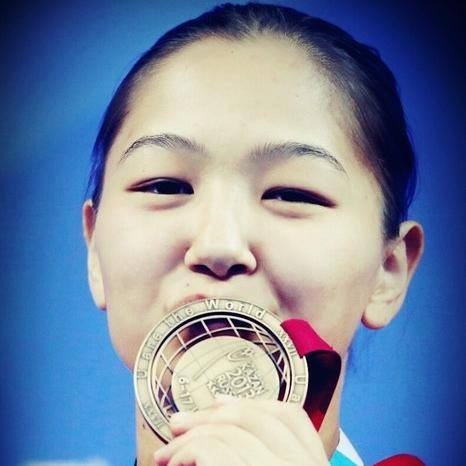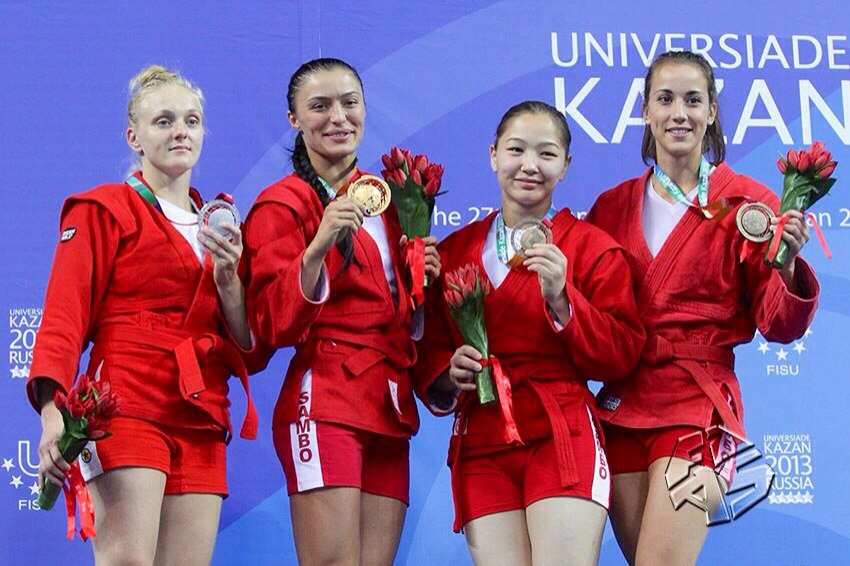ASTANA – Nineteen-year-old Kazakh athlete Azhar Kenbeil has demonstrated excellent results in sambo, the Russian martial arts and combat sport that is very popular in various parts of the world. Kazakhstan is trying to make it popular among the nation’s youth and the sport’s federation can be proud of its efforts and the teens who participate.
 Kenbeil became the world champion among juniors in the weight category up to 60 kilogrammes in Greece in 2013 and South Korea in 2014. She also won the bronze medal at Universiade 2013 in Kazan, Russia while participating as a first-year student at Lev Gumilev Eurasian National University.
Kenbeil became the world champion among juniors in the weight category up to 60 kilogrammes in Greece in 2013 and South Korea in 2014. She also won the bronze medal at Universiade 2013 in Kazan, Russia while participating as a first-year student at Lev Gumilev Eurasian National University.
Kenbeil recently gave an interview to The Astana Times.
Why did you choose this sport?
My father was the Sambo prize winner of the USSR, so probably that’s why I preferred it. All my brothers and sisters are used to leading healthy lifestyles and all of us do sports. I am the second oldest of seven children in the family and am trying to be a good example for my younger brothers and sisters.
You have a big roster of honors. Could you please share your secret at such a young age?
Endurance, physical strength, tricks, speed, temper and a good mentor, I cannot point to exactly one. Here temper and tricks are important, then speed, endurance and a clear head are meaningful against a strong rival. Physical strength is important, but you have to understand when the two athletes meet, no matter how old they are, no matter their experience, tenacity and speed play the main role.
Most of my competitors were European women and it was easier for me to fight against them because I am not very tall, so I can grab another athlete without much effort. It was a problem for them to grab me.
What has been the most difficult fight in your life?
It was the local sambo championship in St. Petersburg, where I fought as an adult. I was stopped by a 40-year-old Belarussian athlete in the first battle. She was much stronger and more experienced than I was. She won by the lock on the knee, which is still aching. She took second place in that championship. It should be noted there are no easy victories. All athletes are well trained. Each fight was like the latest for me.
Which medal is the most important to you?
The most valuable award is the bronze at the Universiade in Kazan which I won in 2013, for at that time I was a dark horse. I was the youngest among the athletes; in 2013 I was barely 17 years old. No one expected the victory from me, even the coach. I was chosen for the team solely to get some experience. This award showed me that I have the temper and strength.
My family. My mom is my biggest fan. She goes with me to all the competitions at her own expense to support me. I have noticed that I struggle more when my mother isn’t with me at the competition.
What has the sport given you in addition to wins?
It has given me a lot of good qualities: independence, confidence in my strength, intransigence. Sport is a life style that will always remain with me. Furthermore, sport has given me a lot of good friends and mentors. I am grateful to my coaches such as Saul Gabdulina, Ayman Kaliyeva and Samat Apakov. Nowadays, I have many friends in other countries where I competed and trained.
Tell me something about your training.
I injured my left shoulder and am now on a train-sparing regime, but before I worked very hard. Every day I spent two hours in the gym. I did 10 pull-ups and 250 abdominal exercises without stopping. At the training camp in Almaty I hold the record for running up the mountains, 50 metres in 12 seconds.
Is Kazakhstan recognised by people abroad?
I was in Japan, Korea, Greece and Turkey and I can say that Kazakhstan is recognised. People in the sports society abroad know boxer Gennady Golovkin, cyclist Alexander Vinokourov and the Astana boxing team. I realised that sportsmen help to form a positive image of Kazakhstan. We are always trying to be dignified and to represent our country.

